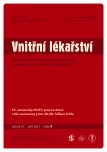Czech angiology and its transformation
Authors:
M. Bulvas
Authors‘ workplace:
III. interní-kardiologická klinika 3. lékařské fakulty UK a FN Královské Vinohrady Praha, přednosta prof. MUDr. Petr Widimský, DrSc., FESC
Published in:
Vnitř Lék 2011; 57(9): 672-680
Category:
65th birthday Mudr. Jany Laciné and and 60th birthday Milana Tržila
Overview
Over the last 25 years, Czech angiology has changed dramatically with respect to the diseases and conditions managed by angiologists as well as available therapeutic modalities. Such developments also required substantial expansion of the extent and character of specialist knowledge required from angiologists. Angiology manages to effectively correlate a clinical profession with non-coronary endovascular therapy and this has brought about a significant improvement in treatment efficacy and comfort. Physicians thus crossed a boundary of purely conservative treatment and focus on life and organ-threatening vascular diseases. Recent years have also seen an emergence of sub-specialities of interventional and acute angiology. The use of diagnostic and therapeutic catheterisation enabled angiologists to contribute to the care of patients previously managed by vascular surgeons and interventional radiologists; angiologists have become important contributors to the medical care provided by comprehensive cardiovascular centres.
Key words:
angiology – endovascular therapy – health care – vascular disease
Sources
1. Puchmayer V. Pohled do historie angiologie ve střední Evropě. Čas Lék Čes 2005; 144 : 56–60.
2. Bulvas M, Sommerová Z, Klézlová R et al. Intravaskulární stenty a komplikace při jejich implantaci. Cor Vasa 1998; 40 : 129–136.
3. Bulvas M, Urbanová R, Klézlová R et al. Markedly eccentric peripheral stenoses: percutaneous atherectomy with an endomyocardial biopsy device. Radiology 2000; 217 : 587–592.
Labels
Diabetology Endocrinology Internal medicineArticle was published in
Internal Medicine

2011 Issue 9
-
All articles in this issue
- Criteria for perioperative risk evaluation – non-cardiac surgery
- Current perspective of treating hypertension in pregnancy
- New antithrombotics in the prevention of venous thromboembolia and new anti-platelet drugs
- Targeted biological treatment of solid tumours
- Proteinuria in primary care
- The importance of antihypertensive therapy in subclinical brain damage
- Plypharmacy and drug interactions
- Is there any relation between diabetes tharapy and cancer risk?
- Combined exercise training in men with metabolic syndrome after acute coronary event
- Diagnostic of secondary hypertension in clinical practice
- FARIM – FARmakoterapie po Infarktu Myokardu (Post-Myocardial Infarction Pharmacotherapy study)
- Thyreopathy in primary care
- Czech angiology and its transformation
- Irritable bowel syndrome
- Biological treatment in dermatology – psoriasis
- Prokinetic agents – their contribution to practice of gastroenterology
- Liver diseases in internal medicine outpatient clinics
- Arrhythmology today: risks associated with anti-arrhythmic therapy in an internal medicine outpatient clinic
- Treating stable chronic obstructive pulmonary disease (COPD) and its potential cardiovascular risks (a basic overview)
- Internal Medicine
- Journal archive
- Current issue
- Online only
- About the journal
Most read in this issue
- Proteinuria in primary care
- Prokinetic agents – their contribution to practice of gastroenterology
- Plypharmacy and drug interactions
- Thyreopathy in primary care
